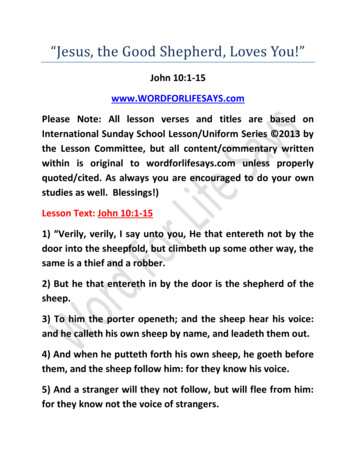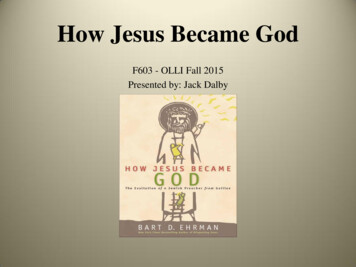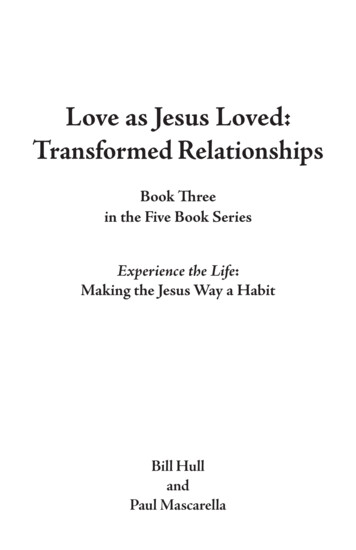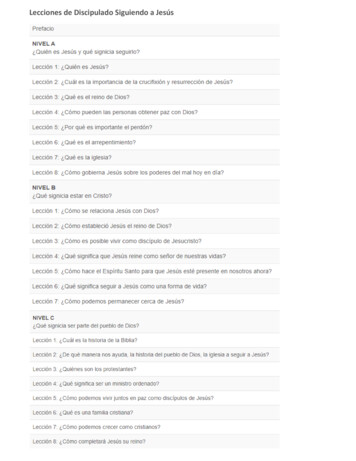
Transcription
“Jesus, the Good Shepherd, Loves You!”John 10:1-15www.WORDFORLIFESAYS.comPlease Note: All lesson verses and titles are based onInternational Sunday School Lesson/Uniform Series 2013 bythe Lesson Committee, but all content/commentary writtenwithin is original to wordforlifesays.com unless properlyquoted/cited. As always you are encouraged to do your ownstudies as well. Blessings!)Lesson Text: John 10:1-151) “Verily, verily, I say unto you, He that entereth not by thedoor into the sheepfold, but climbeth up some other way, thesame is a thief and a robber.2) But he that entereth in by the door is the shepherd of thesheep.3) To him the porter openeth; and the sheep hear his voice:and he calleth his own sheep by name, and leadeth them out.4) And when he putteth forth his own sheep, he goeth beforethem, and the sheep follow him: for they know his voice.5) And a stranger will they not follow, but will flee from him:for they know not the voice of strangers.
6) This parable spake Jesus unto them: but they understoodnot what things they were which he spake unto them.7) Then said Jesus unto them again, Verily, verily, I say untoyou, I am the door of the sheep.8) All that ever came before me are thieves and robbers: butthe sheep did not hear them.9) I am the door: by me if any man enter in, he shall be saved,and shall go in and out, and find pasture.10) The thief cometh not, but for to steal, and to kill, and todestroy: I am come that they might have life, and that theymight have it more abundantly.11) I am the good shepherd: the good shepherd giveth his lifefor the sheep.12) But he that is an hireling, and not the shepherd, whoseown the sheep are not, seeth the wolf coming, and leaveththe sheep, and fleeth: and the wolf catcheth them, andscattereth the sheep.13) The hireling fleeth, because he is an hireling, and carethnot for the sheep.14) I am the good shepherd, and know my sheep, and amknown of mine.
15) As the Father knoweth me, even so know I the Father: andI lay down my life for the sheep.”Introduction:Just in case one may think all these lessons which are basedaround the subject of love may seem redundant week afterweek, I must say, I beg to differ. I believe the more we areexposed to the love of God for us; the more we learn the insand outs of His heart toward people the more we will come toappreciate and hold dear the treasure that is wrapped up in Hislove for us.You see, the world has a way of watering down the word“love.” God has a way of showing the world how real love isfulfilled. It is up to the student of the Word to really get inthere and glean those spiritual inspirations that we begin tounderstand that His love is like no other. His love is beyondcompare. His love shows us what it really means to be caredfor, protected, and to have someone who is always there for us,always supports us, and has promised to never leave us alone.With this week’s lesson, obviously, we are walking down thepath of the love theme once more. This time, we are looking atthe story through the eyes of Jesus Christ Himself as Heexplains His role in loving us as being that of a good shepherd.A few lessons back we examined the good shepherd through
Psalm 23. This week, in John, we see what Jesus expressly hasto say.Lesson Summary:Jesus opens today’s lesson, stating, “Verily, verily, I say untoyou, He that entereth not by the door into the sheepfold, butclimbeth up some other way, the same is a thief and a robber.“ The words thieves and robbers are used interchangeably inthis lesson at least five times. These nefarious individuals whooperate with criminal intent and the opposite of what Jesusdescribes Himself are no good no goods, and only have wicked,selfish schemes in mind. It is this title to whom Jesus makesthis reference to the religious leaders of the day.In chapter 9 prior to today’s lesson, Jesus had another headbutting encounter with the Pharisees. These men wereconsidered to be the leaders of the holy order of the day andthey often found themselves at odds with the things Jesus saidand did on more than one occasion, and one of the things Hedid was heal a man from blindness on the Sabbath. These strictrule keepers prided themselves on adhering to traditions oftheir interpretation of what it meant to keep the Sabbath andother rituals regardless of the needs of others.Never one to shy away from a teaching moment, Jesus usedthis confrontation to set Himself apart from what the religiousleaders were doing (ex. kicking the healed man out of the
synagogue who defended Jesus, John 9:30-34) and tocharacterize Himself as the good Shepherd who loves Hispeople, welcomes them, shelters them, and cares for them inthe safety of His presence.A good shepherd, at night time or whenever the weatherdeemed it necessary, would house his sheep in what is called a“sheepfold” for safe keeping. The only legitimate way to enterin or go out of these enclosures was through the appropriate“door.” If one is attempting to access the confines of thisprotected place by any other means, then one can easilysurmise they are up to no good and their intentions are lessthan honorable and are to be considered dangerous to the foldbecause “the same is a thief and a robber.” No one with goodintentions needs to enter any other way than the door. Onlythose who want to steal and expose the sheep to untruthswould look for devious ways to get to them.In contrast to these crooks, Jesus stated, “But he that enterethin by the door is the shepherd of the sheep. To him the porteropeneth.” The shepherd is the primary caregiver herdsman ofthe sheep. The sheep are totally dependent upon theshepherd. Without the shepherd’s watching, leading, guiding,and providing nature, everything that speaks of his love for thesheep, the sheep would be unkempt, wild, lost, helpless, andunable to fully provide for their own care (compare to Matthew
9:36). Shepherds feed the flock and care for them in such away that they have no need to fear (compare Jeremiah 23:4).The sheep need the shepherd.The true shepherd has no need to sneak around back or climbup a wall to gain access to his own sheep. To draw close to hisflock he simply enters by the right way; he enters through the“door.” When he arrives at the door to take over, the “porter”or gatekeeper opens the door for the shepherd without anyhesitation giving him free access to the sheep.With the shepherd’s close-knit relationship to “his own sheep,”when they “hear his voice” they respond and “follow him.” Ifother sheep are being housed in that particular pen that doesnot belong to the current shepherd who is calling, they will notgive heed to his voice. All sheep “know” the voice of theshepherd to whom they belong because they are familiar withhim through their relationship; they are acquainted with him.Thus, “the sheep hear his voice: and he calleth his own sheepby name, and leadeth them out . . . he goeth before them, andthe sheep follow him: for they know his voice.” I don’t havesheep, but I have two cats that are almost identical. Each hastheir own personality and each has their own name. If I callone cat by name the other does not respond and vice versa. Inour relationship with each other they know me and when Ireach out to get their attention personally, I say their names.
They are known by me and I know them. Years of beingtogether have solidified our relationship and the perimeters inwhich our relationship operates. The same is true forshepherds. If a shepherd calls one name then that one who isin a relationship with the shepherd will respond.When the shepherd is ready for them to be moved out of thepen/sheepfold to go out to pasture the shepherd will walk infront of the sheep, “he goeth before them,” in a leadingposition, that they might “follow him.” If another attempts todo this who is not the shepherd the sheep will not follow.The voice of the shepherd is distinct to his particular flock.Many can try to imitate it but the sheep knows the differentinflections of the voice, a sheep knows if the pitch is off, asheep knows if the intimacy of the relationship is not present inthat voice, a sheep knows if what they are hearing is strange ornot. If what the sheep are hearing is not what they arepredisposed to hearing, in their only defensive measure, theywill “flee” from the false “voice” and will not come near to that“stranger,” “for they know not the voice of strangers.”Please note: If you will allow me to interject here and bring itup to our relationship with the Shepherd of our souls, the LordJesus Christ - tuning into His voice is needed now more thanever. There are so much noise and many voices speaking in ourdaythatviesforourattention.Inour
information/communication era of modern technology, theamount of stuff we have to process and filter through ourhearing and understanding every day is extraordinary. Weneed the tone of the unmistakable tongue of truth spoken fromHis Holy Spirit inspired Word to go before us; to lead the wayfor us to be closer to the Shepherd.“This parable spake Jesus unto them: but they understood notwhat things they were which he spake unto them.” Althoughthe illustration of the relationship of a shepherd with his sheepwould be easily understood by the people of the day whoheavily depended on this, the meaning behind how Jesus wasrelating this to them had escaped their understanding. This canhappen especially if their hearts are hard toward the messageand the Messenger, as the Pharisees often were.“Then said Jesus unto them again, Verily, verily, I say untoyou, I am the door of the sheep.” The shepherds often layacross the entrance of the sheepfold at night to preventanything from going in and out of the pen, thereby makingthemselves the gate or the “door of the sheep.” The buckstops with them. They were the access point of getting in orgoing out. This was perfect for protecting straying sheep fromwandering and also for preventing any ill-intentioned,predatory people or animals from getting to the helpless sheep.
The shepherd, in his love and care for the sheep, literally laidhimself down in a position of protection for them.Truly, the significance of this plays out in our spiritual liveswhen Jesus boldly stated before the people, “I am the way, thetruth, and the life,” (John 14:6). Jesus was the Shepherd andthe door and ultimately He would lay Himself down for thespiritual protection of His sheep when He mounted Calvary’shill.“All that ever came before me are thieves and robbers: butthe sheep did not hear them.” This is a mounting point ofaccusation Jesus is directing in the way of the religious leadersof the day; the false shepherds. Again, we have often seenJesus being very outspoken in the way He saw things beingdone. He often called them out on their self-righteousattitudes (which would eliminate God’s grace and workingpower) and hypocritical lifestyles that puffed up their egos andeased their own burdens while making the load heavier for thecommon man, so to speak (read Matthew 23:13-35 for a quiteextensive list of what Jesus thought of these leaders).Unlike the good shepherd, these false shepherds whom Heidentified as “thieves and robbers” did not draw men andwomen into a closer relationship with God. They werehinderers of the Kingdom work. They misinterpret thingsconcerning the Messiah, His work, and block the way of truly
seeking souls of the truth of this knowledge. In Matthew 23:13,Jesus pointedly said, “Ye shut up the kingdom of heaven againstmen: for ye neither go in yourselves, neither suffer ye themthat are entering to go in.” They were robbing people andstealing away their faith in the true Messiah, our Lord JesusChrist.“But the sheep did not hear them.” There are still some whostand for what is right! Who do not heed the words andteachings of the false shepherds, but adhere and cling to thetrue words of heaven. Who anticipate and declare as Peter did,“Thou art the Christ, the Son of the living God,” (Matthew16:16); who declare He is the true, good Shepherd. And as thenatural sheep turn away from the stranger’s voice so do thespiritual sheep of the Shepherd, they turn from the voice ofthese faith robbers who have tried to lead them astray and “didnot hear them.”Once again, Jesus says, “I am the door.” But this time Heexclusively points out of the door, of Himself, as being the wayof salvation. The word “saved” in verse 9 speaks of“deliverance.” There can only be spiritual freedom anddeliverance found in Jesus Christ. There is no other entrance;there is no other way to get into the kingdom of God withoutgoing through Jesus Christ. “For through him we both have
access by one Spirit unto the Father,” (Ephesians 2:18; alsocompare John 14:6).Jesus is the only way! “Neither is there salvation in any other:for there is none other name under heaven given among men,whereby we must be saved,” (Acts 4:12; see also 1 Timothy2:5). Jesus is pointed to in the Old Testament as being theMessiah (ref. Gen. 3:15, 12:3; 2 Sam. 12-13; Is. 7:14 – just toname a few, there are too many to list). His lineage, bothspiritual and physical, was traced down forty-two generations(Matthew 1:1-17) to become the Savior of the world, of whichHe says of Himself He is the gate or the way. And, He is seen inthe future as the King of all kings and Lord of all lords(Revelation 19:16); the Lamb of God who laid down His life forour sins (Revelation 5) and also the Shepherd who would leadthe flock to fountains of living water (Revelation 7:17). He isthe only way! And those who “enter in” by Him shall be“saved!”They “shall go in and out, and find pasture.” Daily the needsof their souls shall be satisfied. They are safe under theShepherd’s love. The natural shepherd will lead his sheep inand out to find pasture that will nourish their bodies. Ourspiritual Shepherd cares for the soul. Christ has suppliedeverything we need to be spiritually cared for as opposed towhat the false shepherds were doing.
“The thief cometh not, but for to steal, and to kill, and todestroy: I am come that they might have life, and that theymight have it more abundantly.” The “thief” has one agenda:to take what doesn’t belong to him. Jesus has one agenda: togive all that He has. There is a phenomenal difference betweenthe two. Jesus is the possessor of true, eternal life and seeksto extend that to as many as possible. The thief, on the otherhand, wants to “steal, and to kill, and to destroy;” everythingthat stands in opposition to the mission of Christ.Previously, I wrote:“One day I had a lot of trash and recycling to take outbecause it was cleaning day (ha, as if every day isn’tcleaning day). I couldn’t carry it all so I had to make twotrips. First, I took out the trash and placed it in itsreceptacle. As I came back in the house, standing at thedoor in some sort of karate position, like she wanted toattack me, was my nine years old (at that time). I believe Ijust smiled and proceeded to get the recycling. Afterdelivering it to where it belonged, once again, coming backinto the house, there was my daughter again, in herhomemade-karate-ready-to-attack-mode. I said, “Whatare you doing?” She responded, “I thought you might be anintruder.” Why she thought that I will never know, but her
actions and words, though done and said in fun, reallystuck with me.We have a lot of things, people, and circumstances that tryto intrude on what Christ has already secured for us. But,how diligent are we to stand against them to protect that“abundant life?” Do we stand at the door, in position, tofight against any who seek to rob us of this joy?. . . Through Christ we have an overflowing promise doledout to us, but it is often picked away by thieves a little at atime until we have nothing left. . . The abundant life is ours, but there are also some whowant to steal it. Our job is to “resist” and to remain“steadfast in the faith.” When we do that, it is God whoperfects us, establishes us, strengthens us and settles us!Now, that’s the karate chop that will keep intruders atbay!” (Stop a Thief/Word For Life Says)When we hold on to our faith and stand with the GoodShepherd, we are in a position of safety, we are in a place oflove, and we have that abundant life that has been promised tous. Jesus stated that He is the one that has “come” to fulfil thisrole; to give abundant life to those who will follow Him. WithJesus, we have all that we need to be spiritually full andsatisfied for eternal life.
Why is that? Because Jesus said, “I am the good shepherd: thegood shepherd giveth his life for the sheep.” As alluded toearlier in this lesson, Jesus was willing to give all for His sheep.He went into extreme love mode and laid down His life.“Hereby perceive we the love of God, because he laid down hislife for us . . .” (1 John 3:16). Love is the motivation of the goodShepherd.But, when compared with a “hireling” the contrast is quitedifferent. A “hireling” doesn’t feel the same way; he doesn’tfeel that same type of love. They are not his. He is just therefor the job and has no personal attachment or investment inthe care of the sheep. His motives are selfish at best and careonly for himself and his paycheck. His life, in his opinion, is notworth risking for the sheep “whose own the sheep are not.”He’s not going to put everything on the line like the goodShepherd would in order to care for and protect the sheep. If awolf wants them, he can have them. In his mind, he says I amout of here and leaves the defenseless sheep fallen prey to thepredatory wolves.How can he be so insensitive, one might ask? Simply put, ourlesson tells us, he “careth not for the sheep.”Jesus reiterates His position in caring for the sheep. He saysonce again, “I am the good shepherd.” Jesus is in this for thelong haul (remember we still see Him in Revelation 7:17 as the
leading Shepherd). He’s not going to leave when the situationbecomes adverse (compare Matthew 28:20). Rather, His loveand His relationship with the sheep are sweet. Although Hecares for them collectively, He also cares and knows themindividually and personally.2 Timothy 2:19 tells us,“Nevertheless the foundation of God standeth sure, having thisseal, The Lord knoweth them that are his . . .” (emphasis mine).Jesus Christ is personally acquainted with His people. This isbecause of the close relationship He has with them and theyhave with Him. As sheep that will only follow their trueshepherd, as followers of Christ, Jesus said of His sheep, I “amknown of mine.” They intimately know Me. Oh, what sweetcommunion there is in knowing Jesus for yourself!Jesus compared this knowing relationship to that of His Father.“As the Father knoweth me, even so know I the Father.” InMatthew 11:27 He says, “All things are delivered unto me of myFather: and no man knoweth the Son, but the Father; neitherknoweth any man the Father, save the Son, and he towhomsoever the Son will reveal him,” (emphasis mine; see alsoLuke 10:22 and John 17:25). The good Shepherd knows Hissheep as intimately as the Father knows Him and He, theShepherd, willingly lays down His “life for the sheep.” “Whogave himself for our sins, that he might deliver us from thispresent evil world, according to the will of God and our Father,”(Galatians 1:4; see also 1 Corinthians 15:3 and Revelation 1:5).
Life for life, He gave up His that we might find ours in eternity.That’s love.Conclusion:Jesus, the good Shepherd, loves you so much He thinks you’reto die for!
“Jesus, the Good Shepherd, Loves You!” . destroy: I am come that they might have life, and that they might have it more abundantly. 11) I am the good shepherd: the good shepherd giveth his life for the sheep. 12










